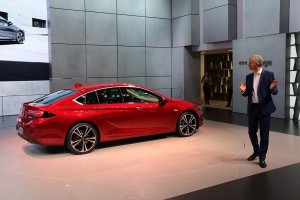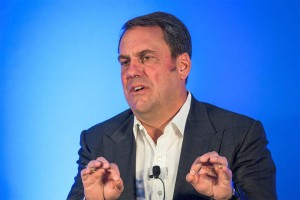General Motors has begun to evaluate what could happen to its future plans if the Trump administration’s border tax takes is approved in Washington D.C. even as it prepares to import the 2018 Buick Regal from Germany.
Mark Reuss, GM executive vice president for product development, confirmed that the next generation Regal, which is scheduled to appear in showrooms next fall as both a sedan and as a wagon, will be built at the Opel factory in Russelsheim, Germany.
The production of the Regal in Russelsheim will go forward even though GM is selling both Opel and Vauxhall to the Paris-based PSA Group, Reuss said. The GM-PSA deal is expected to close before the end of the year but encompasses the production of Buick models, such as the Regal and the convertible Buick Cascada, which is built at an Opel plant in Poland.
Reuss added that product plans put in place by car makers take years to complete. The assumptions used for building the Buick Regal in Germany did not include the imposition of a U.S. border tax, which could raise the price of the Regal and any other imported vehicle significantly.
(Opel Insignia offers strong hint of next Buick Regal. Click Here for the story.)
The prospects for Congressional approval of a “border tax” that has been discussed by the Trump administration and Speaker of the House Paul Ryan remain unclear, Reuss said.
“No one really knows this stuff. How do you make product plans and capacity allocation? We don’t really know what that is,” Reuss said when asked about the impact a border tax might have on the Buick line.
If a new tax is imposed, he indicated that GM is developing contingency plans that would allow the company to shift products, production, technology and capital. “The agility piece is very important. You have to be prepared to do it faster than anybody else,” he said.

Opel designer Mark Adams with the new Opel Insignia, which will be the blueprint for the new Buick Regal.
Buick now sells vehicles in the U.S. that are built in China and South Korea as well as in the European Union.
(Click Here to see more about the proposal for two classes of GM stock.)
Meanwhile, President Donald Trump is scheduled to meet in Florida with Chinese President Xi Jinping and trade between the two countries is expected to be on the agenda. Trump, while vowing to bring manufacturing jobs to the U.S., has been slow to offer specific proposals on changing the complex laws, treaties, agreements and international regulations now govern global trade.
The border tax itself also has become wrapped up in Republican plans for revising the federal tax code and reducing the U.S. corporate tax rate. Speaker Ryan is supporting the border tax as a new and critical source of revenue that would offset the money lost when the corporate tax rate is reduced.
However, car dealers, retailers, farmers, and manufacturers, as well as major Republican donors have come out against the idea of border tax, saying its bad policy that could invite retaliation by the U.S. trading partners.
(Wrapping up the Opel sale could take years, create challenges for Buick. Click Here for more.)
Car dealers have warned a border tax would raise prices and lead to reduce sales and lead to fewer jobs once demand for new vehicles start to fall.

